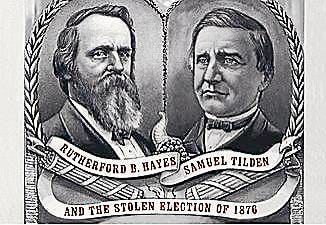With 2024 just around the corner, the Presidential race is heating up. We are coming off the most contested election since 1876, and polls have us heading for a rematch of Trump and Biden. Americans are rightfully concerned about the safety and integrity of our election system. Let’s look back to 1876 and see what we can learn.
In 1876, the wounds of the Civil War remained fresh. The presidential election was between Republican Rutherford B. Hayes and Democrat Samuel J. Tilden. A race that would test the nation's commitment to Reconstruction and challenge the very foundations of its electoral process.
The Southern states still rebuilding after their defeat in the war were chafed under the policies of Reconstruction, which were enforced by federal troops stationed throughout the region. These policies aimed to protect the rights of newly freed black citizens and ensure fair elections, but they also produced resentment among many white Southerners.
As the votes were tallied, Tilden secured a majority of the popular vote and appeared to be just one electoral vote shy of the presidency. However, the results in four states—Florida, Louisiana, South Carolina, and Oregon—were hotly disputed. Both parties claimed victory in these states, leading to an unprecedented situation where multiple sets of electoral votes were sent to Congress.
In the South, there were widespread reports of voter intimidation against black voters by white supremacist groups. Both sides alleged ballot stuffing, bribery, and other forms of voter fraud. The nation watched with bated breath, unsure of how the impasse would be resolved.
Congress established a bipartisan Electoral Commission to address the crisis, consisting of five senators, five representatives, and five Supreme Court justices, split among party lines of eight Republicans and seven Democrats. In a series of party-line votes, the commission awarded all the contested electoral votes to Hayes, giving him a narrow victory in the Electoral College.
Democrats complained they were cheated, leading to talks of a violent march on Washington. Behind the scenes, leaders from both parties negotiated a compromise to ensure a peaceful transition of power. Known as the Compromise of 1877, the agreement stipulated that Hayes would become president in exchange for the withdrawal of federal troops from the South, effectively ending Reconstruction.
During the Hayes administration, the Democratic majority in the House of Representatives formed the Potter Committee to investigate accusations of Republican election fraud. Speaker of the House Samuel J. Randell stacked power to one side, nominating seven Democrats and four Republicans. The committee was designed as a partisan weapon against the administration more than a serious effort to uncover wrongdoing.
However, in 1879, while the committee was winding down, the focus shifted to possible election fraud by the Tilden effort with the discovery of the cipher telegrams. This was communication between democratic operatives discussing paying off election boards. The central figure in this scandal was Samuel Tilden’s nephew, William Pelton.
Future Speaker of the House Thomas Brackett Reed, one of the four Republicans on the committee, used his prosecutorial experience when questioning Pelton. Pelton admitted to making unsuccessful efforts to purchase the support of electors. Reed tried to connect the fraud to Tilden but was unsuccessful. There was no hard evidence to tie him to the scheme, but Tilden did accept his embarrassing lack of awareness of what was going on around him.
The Potter Committee Report was buried and had little impact on the perception of who won the election of 1876. The voter fraud and intimidation that led to this disgraceful chapter in our Republic went ignored, and the nation moved on to the next problem. The Republicans remained in power, but the Democrats were successful at ending Reconstruction.
Did election fraud occur in 1876? Absolutely. One side leaned on force and intimidation, and one side leaned on majority power, but no one was innocent. What happened in 2020? Americans lost their innocence, but it wasn’t the first time and probably won’t be the last.
So, as Americans look forward to casting their ballot in 2024, they are still scarred from 2020 and looking for answers. Remember, history is often forgotten, leadership is difficult, and compromise is the friend of peace.
Jeff Mayhugh is the co-founder of the Madisonian Republicans and a former Congressional Candidate for VA10. @Jmayhugh28
The Freemen News-Letter is an online media publication presented by The Freemen Foundation as part of its effort to reinvigorate and elevate political dialogue in America. Please consider offering a donation to our efforts.




Love this piece. The "compromise" (linked in your article) was one of those pivot points in our history having ripples felt even today.